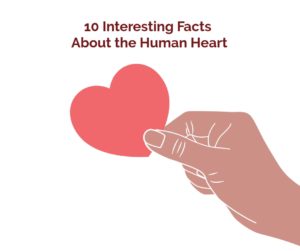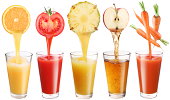 Ours hearts are essential to our survival. They are part of our circulatory system and they are responsible for pumping oxygen-rich blood throughout our body, but how much do we really know about our heart?
Ours hearts are essential to our survival. They are part of our circulatory system and they are responsible for pumping oxygen-rich blood throughout our body, but how much do we really know about our heart?
Here are 10 interesting facts about the human heart that you may not have known:
- The average heart is the size of an adult fist.
- Your heart will beat about 115,000 times each day.
- The beating sound your heart makes is caused by the opening and closing of its valves.
- Each day, your heart pumps about 2,000 gallons of blood.
- If you were to stretch out your blood vessel system, it would extend over 60,000 miles.
- The human heart weighs less than one pound, but a man’s heart is typically two ounces heavier than a woman’s.
- A woman’s heart beats slightly faster than a man’s.
- There is such a thing as a broken heart. Symptoms are similar to a heart attack but the cause is usually stress and not heart disease.
- Laughing is good for your heart. It reduces stress and gives a boost to your immune system.
While these facts are meant to be light and fun, the most important thing to understand is how important it is to maintain proper heart health. By eating right and exercising, you can remain heart healthy.
To speak with a doctor at Flushing Hospital about your heart health, please call 718-670-5486.
All content of this newsletter is intended for general information purposes only and is not intended or implied to be a substitute for professional medical advice, diagnosis or treatment. Please consult a medical professional before adopting any of the suggestions on this page. You must never disregard professional medical advice or delay seeking medical treatment based upon any content of this newsletter. PROMPTLY CONSULT YOUR PHYSICIAN OR CALL 911 IF YOU BELIEVE YOU HAVE A MEDICAL EMERGENCY.



